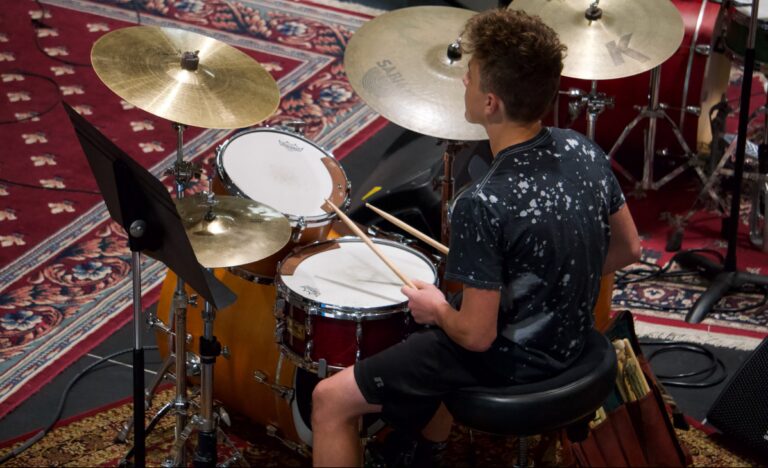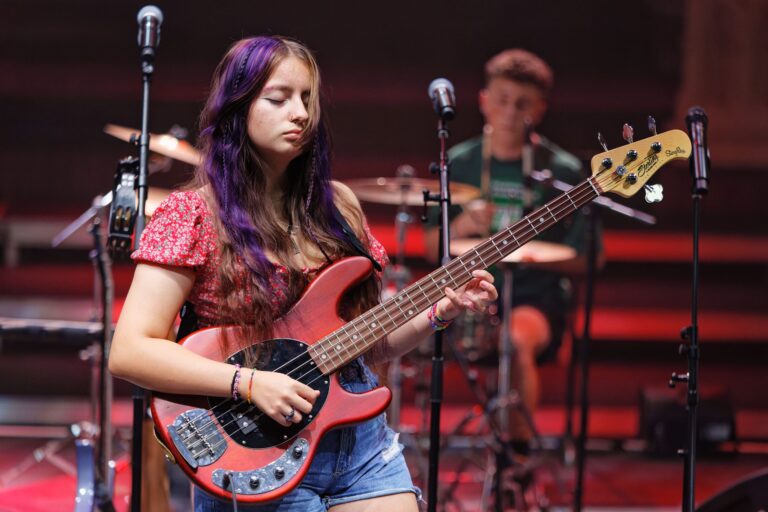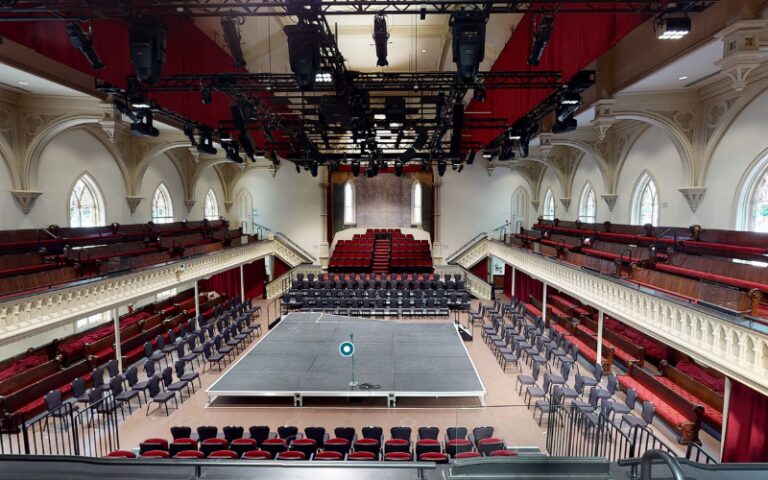Over July 10-21, Proctors Collaborative School of the Arts is hosting Rock Camp, a program designed to provide an environment for aspiring musicians (ages 10-16) to strengthen their skills, develop new techniques and build confidence in performing.
From 9 am to 4 pm, Monday through Friday, Rock Camp deals with several aspects of music, including technical aspects of instruments, the musical history of the genre, song writing, theory, arranging, rehearsal techniques, stage presence, and more.

With practical instruction from professionals, students are exposed to the elements of performing, arranging original music, forming a band, and much more. Additionally, a gig in the Great Hall of Universal Preservation Hall (UPH) to showcase their talents. We spoke with Crispin Catricala, the director of Rock Camp this summer, to learn more about the program, its origins, audition process, and outcomes.
Background
Rock Camp is not the first musical camp to be hosted at Proctors Collaborative School of the Arts. However, the origins of Rock Camp begin with director Crispin Catricala, selected specifically for the program.
Proctors Collaborative School of the Arts has had long success with their other camps like the Broadway Camp, Broadway Camp Junior and Summer Stage Young Acting Company. I was honored when, just after I had retired from teaching public school, they approached me to be the director for a new summer camp for young rock musicians up at UPH in Saratoga. With a bit of a delayed start due to the pandemic, we started our first summer session in 2021 and have been growing ever since.
Crispin Catricala, born into a musical family, has long possessed a passion for music, playing guitar by 13, and playing professionally by 17. Crispin would go on to receive a Bachelor’s Degree in Music Composition and a Master’s Degree in Musical Education, teaching public school music education for more than 28 years. Additionally, Crispin has worked as a private guitar instructor for more than 30 years, and has played in several bands throughout all that time.

Audition Process
An audition based program, Rock Camp requires musicians to record a performance of two songs that they feel comfortable with. However, the recording itself can be quite basic – according to Crispin, an iPhone video would suffice. Musicians can play along with tracks, as long as it is clear that their playing is separate from the original recording.
So, what qualities does Rock Camp look for in potential musicians? While Rock Camp is open to all styles of rock music, Crispin noted that they specifically seek individuals who possess basic, foundational skills, and demonstrate a desire to enhance their knowledge and acquire additional expertise. Critical thinking and active listening skills are important for applicants, but most of all, a love and passion for music and an openness to feedback within the creative process are necessary.
This year, 17 young musicians were selected to join the program.

A Typical Day at Rock Camp
The two week program runs Monday through Friday, from 9 am to 4 pm. Crispin’s detailing of a typical day at Rock Camp reveals the enriching, well-rounded nature of the program.
Morning sessions generally deal with either a guest artist/presenter, a lesson that deals with either your instrument or maybe a lesson that deals with music history or theory. By afternoon we’ve broken down to smaller ensembles working on specific songs and by the end of the day meet upstairs to play for our peers on the main stage and group discussion.
Rather than form one or two bands that rehearse a set of songs together, the program forms numerous combinations of musicians, making up several groups song by song for an evening’s performance. According to Crispin, this allows the musicians to engage with everyone in the camp and not be grouped into one ensemble or style.
Rock Camp is open to young musicians ages 10-16. While the age gap may seem wide to some, Crispin explained that the music itself works as an equalizer.
Once you start making music with people, age is not a huge factor. Plus, we’ve had 11-year-olds that have been playing since the age of five and 14-year-olds that started when they were twelve. So really, everybody has something to bring to the table.

Program Goals and Outcomes
At the end of the two-week camp, the groups will perform an hour-plus concert, open to the public at UPH, complete with incredible lighting and sound in one of the area’s newest and most beautiful premiere performance spaces. While the performance will surely showcase the talent and accomplishments of the program, Crispin hopes that the impacts of Rock Camp on the musicians will run deeper.
Our hope and our expectations are that the experience leaves everyone better at their instrument and overall craft. Also, that new musical connections and friendships have been created that could last long past Rock Camp.

For more information about Rock Camp, the audition process, and ticket reservations for their performance at UPH, visit this website. To learn more about camp director Crispin Catricala, visit his website.


Comments are closed.